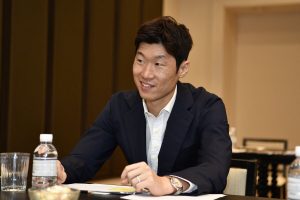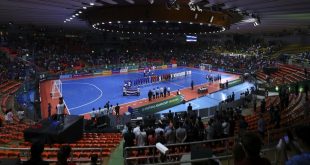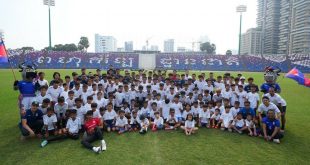 Ever since hanging up his boots in 2014, Asian legend Park Ji-sung has dedicated his time to improving the standards of Asian football.
Ever since hanging up his boots in 2014, Asian legend Park Ji-sung has dedicated his time to improving the standards of Asian football.
A centurion with South Korea, Park was the first Asian player to score at three successive FIFA World Cups and his trophy-laden spell at Manchester United made him one of the most successful Asian players of all time.
After retirement, he ventured into football administration and completed the FIFA Master course in 2017. Park went on to serve as the head of the Korea Football Association Youth Development Strategy from 2017 to 2018, and has been associated with K League 1 side Jeonbuk Hyundai Motors since 2021, where he is currently the Technical Director.
The 42-year-old, who was part of the Asian Football Confederation (AFC) Social Responsibility Committee in 2015, recently took up a new challenge as Chairperson of the AFC Professional Football Task Force, an appointment that was confirmed in March 2023.
A new initiative that was approved for establishment by the AFC Executive Committee in February 2023, the AFC Professional Football Task Force is a dedicated effort to oversee the transformation of Continental club football.
In this exclusive interview, Park speaks to the-AFC.com about his latest role with the Confederation and how he wants to help Asian football grow.
Following your retirement, you have lent your expertise to expand and improve grassroots and youth football infrastructure in Asia. Can you tell us how this opportunity to be the Chairperson of the AFC Professional Football Task Force came about, and why you wanted to take it up?
After footballers retire, the normal direction is to become a coach, but I didn’t think that was the right role for me. But I still wanted to be involved in football, so I turned my focus towards a more administrative role and spent some time educating myself through sports management studies, and also acquainted myself with the grassroots and youth football structures in Asia.
My experience has taught me that there is a lot of untapped talent in Asia, and we can improve our youth structures, so that we can provide future generations with the right infrastructure and environment.
If we invest our resources the same way that some of the best youth systems in Europe and South America do (for example), I am confident that we can see a lot of great players emerge from Asia in the future.
When did you know that you wanted to do something else instead of being a coach?
You know, during my career, I worked under two of the greatest head coaches: Guus Hiddink and Sir Alex Ferguson. Both had traits in common, such as being able to communicate with players in a special way. They can make the players follow directions, motivate them to give 100 per cent on the pitch – those communication skills were unbelievable. The first team has more than 20 players but only 11 start every game, so you have to manage all other players through the whole season – that’s a really difficult thing to do. It is something which I think I can’t do, to deal with players (skilfully) and so on; I think that’s the most important skill for a head coach.
But I had a great experience in Europe, which (I felt would) definitely help in Asia. So then, what should I do? I thought there was one way, which is to be an administrator. That’s why after I retired, I studied sports management (FIFA Master) in Europe and then started to be involved in the Korean Football Association and then the AFC and so on.
That helped me have a better understanding of football and have a vision for it. Before, as a player, you do what the head coach wants you to do but you don’t pay attention to a lot of other things happening around the football pitch. Even though it was hard, the time I spent studying helped me gain more experience and knowledge.
Do you already have any ideas in mind that you would like to implement?
Firstly, I want to spend some more time familiarising myself with the many diverse systems that currently exists in Asia and expand my knowledge beyond what I have learnt during my time in Japan and South Korea. After that, I would explore ways to improve them and help them strive for higher standards.
The AFC has undergone significant changes in the past year, such as the impending three-tiered club competition format and an increase in the foreign player quota. How do you think these will benefit Asian clubs?
With these new changes, we can expect the standard of play to rise which will, among other things, give fans an impetus to be more engaged with football in Asia.
Similarly, now that our doors are (more) open to foreign players, the domestic footballers will automatically be challenged to raise their standards in order to keep their place in the team.
Additionally, with more matches, there will be more (intense) competition which will contribute to the overall improvement in the standards of football in Asia. Of course, we will need to see how things go and adjust accordingly. But it is good to see new, fresh changes being implemented.
You have spent most of your career in top clubs with world-class professional standards. What are some of the key professional development areas that can be adapted to Asian football? What are some of the challenges you anticipate?
Europe and Asia are completely different but with Europe in many ways being the benchmark for football development, we can surely inculcate aspects of the European systems and modify them according to Asian needs.
There is so much potential in Asian football but to tap into that talent, we need to focus on all our Member Associations (MAs) and not just those who have already had some amount of success on the global stage.
As a Confederation, all MAs need to pool their resources to lift each other up. Otherwise, it is difficult to attain holistic development.
One of the biggest challenges that exists for us is the size. In comparison to Europe, it is not so easy for us to travel from one end of the Continent to the other (to learn from each other) and it is not something that we can change. What is under our control is how we manage this challenge. I want to make sure… that there is a lot of inter-continental movement in the future.
Right now, our solution has been to divide the teams participating in competitions such as the AFC Champions League™, into regional zones, but in time, we will have to find a way to ensure that inter-zonal meetings take place at frequent intervals so that teams can use the opportunity to adapt to the diverse characteristics of our Continent — be it cultural or technical.
In my playing days, we didn’t pay a lot of attention towards youth football. I think our priority should be the standardisation of its infrastructure to ensure the development of youth coaches, competitive tournaments and leagues.
We need to incorporate the best practices from the best systems from around the world and adjust them according to the needs of each country in Asia because the requirements of each of our MAs can be vastly different.
For generations of aspiring players in Asia, you have been the ultimate success story. Do you enjoy the responsibility of inspiring the Continent’s youth or were there times where you’ve felt it was perhaps a burden?
Yes, I did feel the pressure sometimes. While I was playing in Europe, the fact that I was representing Asia and that the prospects of other Asian players rested on the success I attained, was always at the back of my mind.
I admit that some of the pressure was self-inflicted, as with our Semi-final finish at the FIFA World Cup in 2002; I was hungry to prove that Asian teams could be at par with the best of Europe. I was proud to represent Asia and I wanted my success to open doors for more players from the Continent in the future.
Today, it makes me incredibly happy to see the likes of Son Heung-min doing so well in the English Premier League but what I really want to see is players from other Asian countries, besides the likes of South Korea and Japan, find their way to the top leagues in the world.
Asian teams have shown tremendous progress in the last decade. What do you think has been the biggest factor that has led to our teams’ success on the world stage?
The performance of Asian teams in the last few FIFA World Cups has been impressive and a key factor behind it has been the inroads that Asian players are making in leagues in other continents. Learning the different styles of football and sharing that knowledge in their respective countries has been instrumental in the growth.
The same formula, in an intra-continental context, can help Asian players acquaint themselves with football from the different regions within Asia, which can play a massive role in the overall enhancement of the sport on a continental level.
You never played senior football in the K League but started in Japan for a couple of seasons before moving to Europe. How did that contribute to shaping your career?
Having played for the national team in the Olympics and then training in Europe as a 19-year-old, I learnt at a very young age how diverse football can be and it made me dream of playing outside my own country to gain even more exposure.
Japan is quite similar to South Korea, although it’s still a different language and a different culture, so I could (more) easily adapt there. Playing in Japan (with Kyoto Sanga) and learning their ways made me a stronger person and helped me prepare myself for my adventures in Europe.
Europe was completely different from Asia. The grass is different, the weather is different. But the experience I had in Japan helped me to adapt, because I already had to learn a new language, adapt to a new culture.
So, if you go directly to Europe for the first time (from your domestic league), it could be more difficult, because you don’t have any experience of playing abroad and living in a different country.
If I have any advice, it is probably to learn the language (of the new country) before going. If they can speak any European language, (you can be sure that) someone in their team will also speak it, it doesn’t matter if it’s Portuguese, English or French.
At that time back then, nobody told me I should pick up a new language! In the Netherlands, they had Dutch classes for foreigners, and also privately, I had English lessons. So the little English I spoke by the time I went to the United Kingdom, helped me a lot while communicating with players and adapting to their culture.
Speaking about playing in leagues of the highest standards, we now have the likes of Son and Kaoru Mitoma, who have become household names all over the world, largely because of how successful they have been in Europe. What do you think it will take for the standards of Asian Club competitions to be so high that Europe will not be the only benchmark for success?
Asia has a huge fan base and, of course, they follow European football. But still, domestically, you can see their passion and how crazy they are towards football. So, we need to make sure that all these fans are more interested in their (domestic) leagues by having better performances.
We need to see more Asian players in each league. So (for example) in Europe, you look at the Eredivisie – not just Dutch players play there, but there are lots of players from other European countries. In Asia, you don’t really see that a lot – usually, the domestic leagues are mostly made up of local players. Having more different Asian players in (any) one league could help the leagues reach higher levels (of competition), and also the fans will be more interested in it.
It takes time, I know, but we need to go in that direction and (think about) how we are going to make it (happen). With more interesting developments… it could lead to the media having more interest as well (and then) generating more coverage about their leagues.
We are seeing more of that now, actually, in terms of players going to other Asian leagues instead of directly to Europe. Do you think that is a viable progression pathway?
Yes, definitely. Even in South Korea, in Japan, not many players go directly to the big leagues in Europe. They go to some of the smaller leagues to adapt and then they take the next step to a big league. We can implement the (same idea) in other Asian countries as well. For example, players in Indonesia… (can move to) Japan, South Korea, Saudi Arabia or Iran, for example. And then since it is their first time in a different country, it means they have to adapt not just only to football but also off the pitch like culture, lifestyle, and language. They can experience different things and know how to survive abroad.
If they go from their own league (straight) to Europe, the difference in level can be quite big and the change can be too big and too sudden. I would suggest for them to go to a higher level (in Asia) and adapt, and if they perform well, the next step will be towards another higher level that could be more suitable in their journey.
Outside of football, what is Park Ji-sung like?
I spend most of my free time with my family. It is something I really wanted. If I were to be a coach, I wouldn’t have time to do that, but I can do that now. My kids are seven and five, so they still need to be taken care of and I want to spend more time with them.
I am based in London, this is my home now. These days, I do Zoom calls and meetings. Sometimes, I travel for work. I work for the Korean club, Jeonbuk Hyundai Motors, so that is why I often go to South Korea to spend time. Also, in the summer, the whole family goes there and stays for a month or so. This way of working is well-balanced for me… I am happy with my lifestyle at the moment.
Sometimes I go to watch the football. Son plays in London so I go to Tottenham Hotspur to watch his games. Sometimes, I meet Son for dinner and also Hwang (Hee-chan; Wolverhampton Wanderers forward) when he comes to London. I just keep in contact with them and speak to them.
[Points at piano behind him, laughs] I’d like to learn the piano one day! It’s my daughter’s and probably one day, I will try! At the moment, I am cycling. My knees are not good so that is why I can’t jog, but cycling helps me to reduce the pressure on my knees and helps me stay fit.
What do you see yourself doing in the next few years?
I don’t have a specific goal at the moment. After retirement, I just wanted to share my experience with Asia. This will be a four-year role; after that, I don’t know what will come to me, perhaps there will be other opportunities.
For now, I just want to focus on my target, which is to help more Asian players develop themselves, to have big dreams. These days, Asian players can dream of being the best in the world. Before, (maybe) we couldn’t dream about that, but these days it can be possible. I want to try to help that kind of thing happen in the future.
I also want to see more AFC Member Associations involved in the World Cup and succeed. We have 47 Member Associations in the AFC and I want to see more compete at the top level, which will also lead to a more interesting AFC Asian Cup as well.
I am really pleased that I have remained connected to the sport through the AFC after retirement. It has given me the opportunity to engage with people from all over the Continent, which has kept me on a continual learning path.
Watching the hard work put in by people working towards the development of football in Asia has been particularly gratifying and I am very excited to take on this new role and will do my best to help Asian football grow.
 Arunava about Football A look at football & the world through my eyes!
Arunava about Football A look at football & the world through my eyes!



